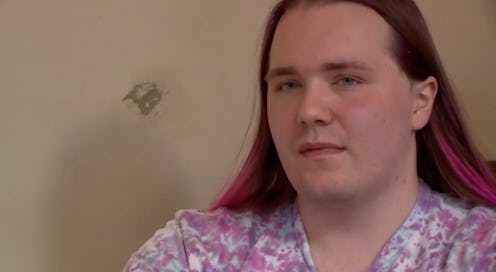Life
A White Person Claimed To Identify As Filipino In An Interview & People Are Not OK With It
A person in Florida has recently spurred controversy over the concept of "transracialism" — aka, taking on the identity of a different race. Ja Du, a "transracial" white person, gave an interview to WTSP-TV, a local Florida news station, claiming to identify as Filipino. People on the internet have a lot of opinions about the story, with some comparing it to cultural appropriation, and others pointing out how the term "transracial" is an appropriation of itself.
According to WTSP, Ja Du first became interested in Filipino culture after watching the History Channel. “I’d watch the History Channel, sometimes for hours ... nothing else intrigued me more but things about Filipino culture,” Ja Du told WTSP. Growing up, Ja Du sought out Filipino culture. “Whenever I’m around the music, around the food, I feel like I’m in my own skin,” Ja Du said. As an adult, Ja Du drives a Tuk Tuk, a vehicle used for public transportation across south Asia.
Ja Du is aware of critiques of the "transracial" lifestyle. “I believe people will [take advantage] just like other people have taken advantage of their identity to get their way, but the difference between me and them...is that I don’t want that. I think that we all have the freedoms to pursue happiness in our own ways,” Ja Du told WTSP.
According to WTSP, Ja Du hasn’t told family members about being transracial. "Telling [my mom] something like that is just too wild," Ja Du says in the video. (WTSP also reports that Ja Du is "transsexual" and has told family members about wanting to "change gender." WTSP uses the pronouns he/him to refer to Ja Du, while other outlets have used she/her, but it is not explicitly clear what pronouns, if any, Ja Du uses.)
The story has drawn comparisons to what happened in 2015, when Rachel Dolezal, a woman of European descent, claimed to identify as a Black woman. Dolezal had attended Howard University (a historically Black university), then was the president of her local NAACP (National Association for the Advancement of Colored People). Dolezal even changed her name to Nkechi Amare Diallo, a West African name that means “bold gift of God.” And people had a lot to say, noting that people of color don't have the option to identify as white (and this was in fact a criminal offense in the U.S. for a number of years).
With the emergence of a new public case of a person claiming to be "transracial," some people are pointing out another reason the "identity" is misguided. "Transracial" was originally a term that referred to a person or a couple of one race adopting a child of another race, which is also referred to as interracial adoption. Now, after Rachel Dolezal and other cases of (mostly white) people identifying as another race, "transracial" has taken on a whole new meaning. Some transracial adoptees take particular offense to the new definition because it obscures their identity as people of color who were raised by white people. There are specific traumas and struggles that only transracial adoptees share. People who claim to be "transracial" co-opting their term is yet another.
However, according to WTSP, Ja Du doesn't necessarily see it that way. “I think before we get offended, we need to take a step back and think about what is the harm,” Ja Du told WTSP. “If that’s who they are and they want to celebrate it and enjoy it, then you have to think what harm is it doing? All they want to do is throw themselves into that culture and celebrate it.”
Many people are criticizing Ja Du's claim, saying that identifying as a person of color when you are not is still indirectly harmful. First, Filipino isn’t a race — it’s a nationality, one with a violent history of colonialism by Americans and Europeans alike. Ja Du can celebrate and appreciate Filipino culture without trying to be Filipino. Additionally, many advocates for the transgender community have commented that "transracialism" de-legitimizes transgender identity and, thereby, the struggle for trans rights; as one Guardian article by Meredith Talusan says, "The fundamental difference between Dolezal’s actions and trans people’s is that her decision to identify as Black was an active choice, whereas transgender people’s decision to transition is almost always involuntary."
The fact that Ja Du can hide “being Filipino” from family members is a privilege actual people of color don’t have. People of color are often judged based on skin color and other physical features, things that cannot be hidden when convenient. Racial identities aren’t costumes to take on and off. Thinking they are is a privilege only white people possess.
